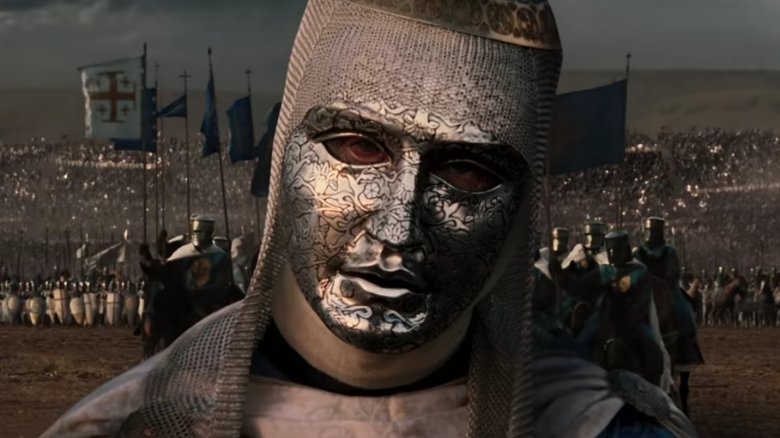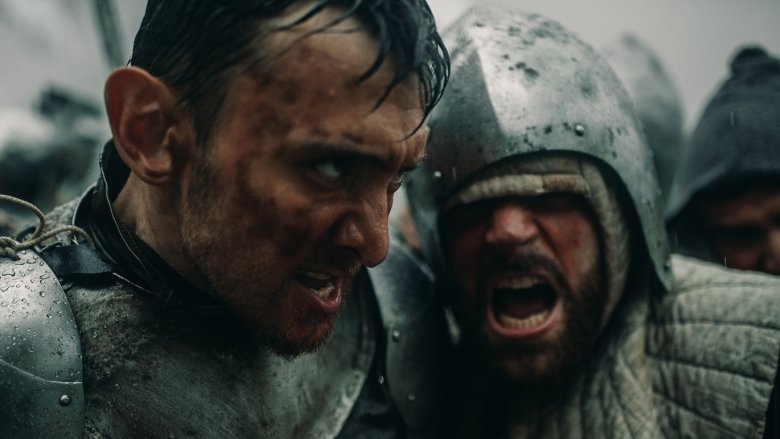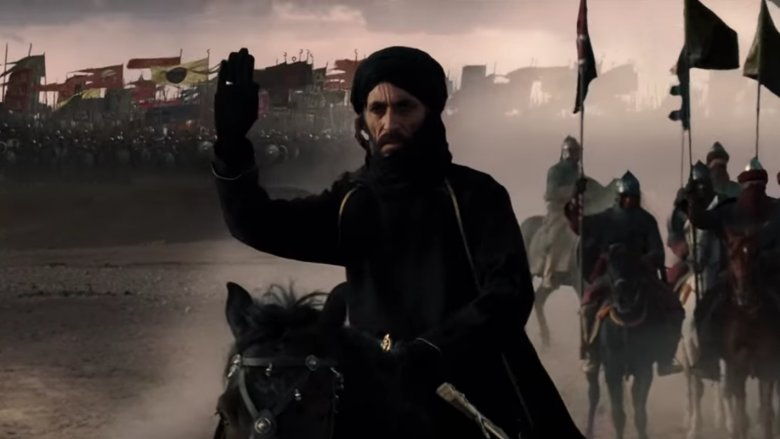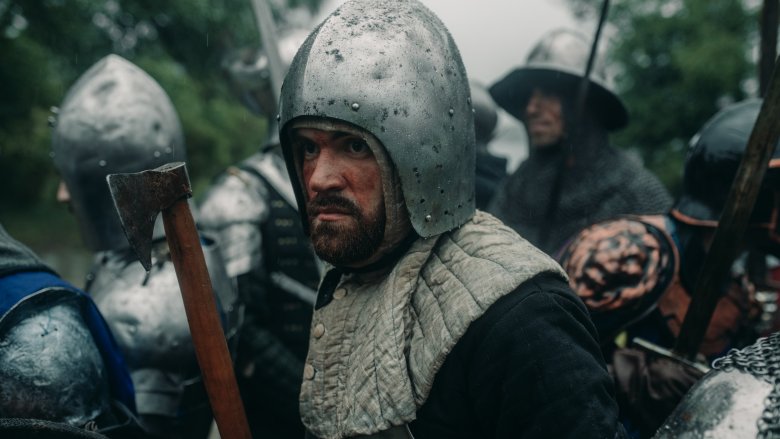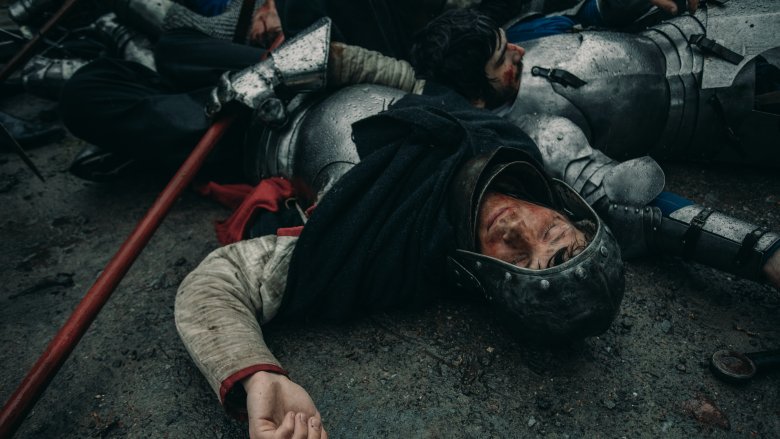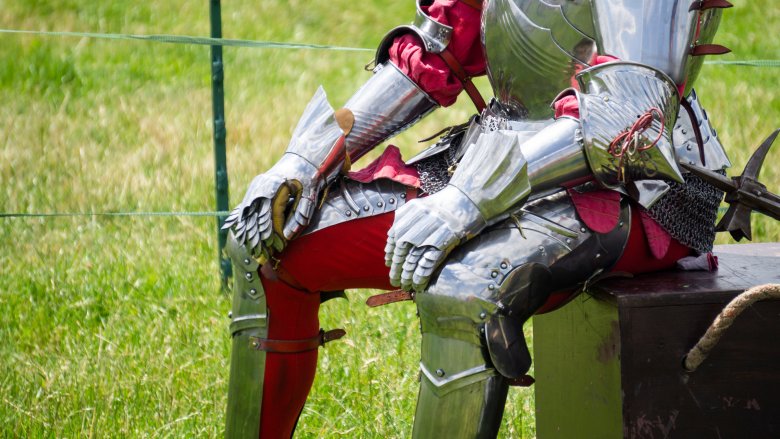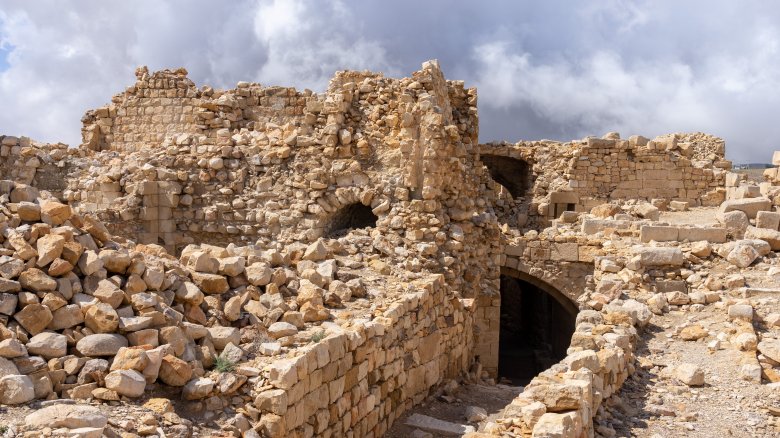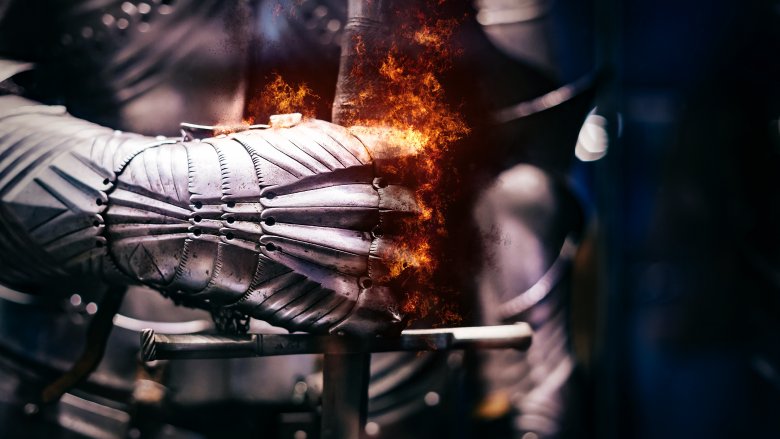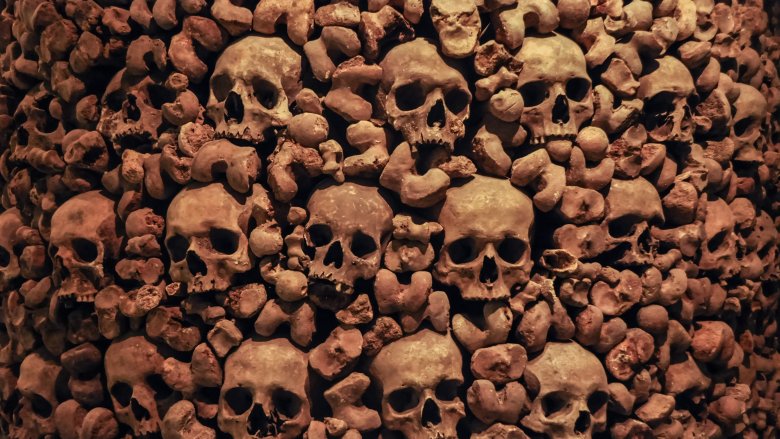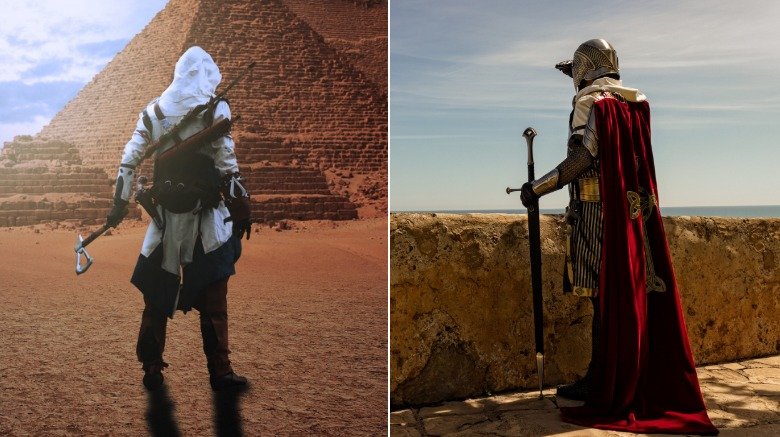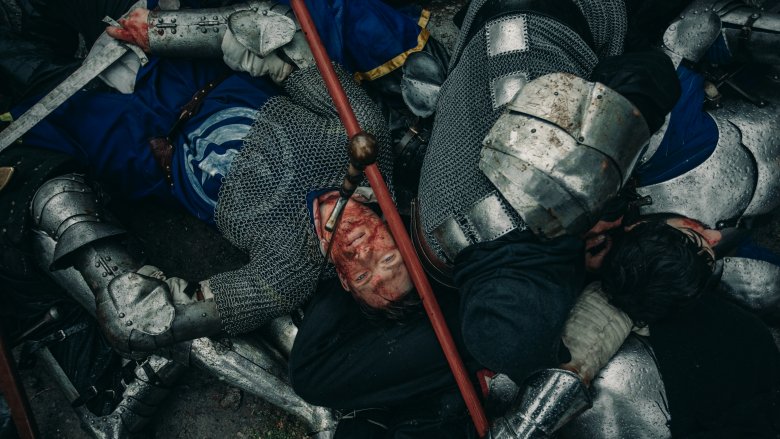Why You'd Never Survive Life During The Crusades
Imagine that you're reading this from the comfort of a toilet. (You might not have to imagine.) This isn't just any toilet but a magic portal-potty. When you flush, it transports you Super Mario-style to a random place and time during the Crusades. Here's a bit of background information about the period. In 1095, Urban II, pope of the Holy Roman Empire, convened the Council of Clermont in France to shore up his power in the face of a rival pope and because the neighboring Byzantine Empire "was losing territory to Muslim Turks." Hoping to kill two birds with even more killing, Urban called for a holy war against Muslims to reconquer the Holy Land, the crown jewel of which was Jerusalem.
Urban's words sparked the first of eight main Crusades plus various related battles, massacres, and excursions. Occurring between 1096 and 1291, these events would shape the world's geopolitical landscape for centuries to come. Your only objective is to survive the perils that await you. Think you'll cheat death? Here are 12 reasons you most likely won't.
Starvation or starving cannibals would kill you during the Crusades
Let's say you embark on the First Crusade in 1096. The pope has promised that if you die in combat, all your sins will be forgiven and you'll go to heaven. If you're a knight, that's extremely convenient because you also fight in non-holy wars, which are considered "sinful." Plus, if you don't fight, you'll be branded a chicken.
If you're a peasant, all that talk about chicken would be maddening because you don't want to go to hell for eating a Kentucky Fried Crusader, but you're just so hungry. Per National Geographic, famine had ravaged France over the previous century, killing thousands of peasants and forcing many to resort to cannibalism. "The first crusaders were actually undisciplined hordes of French and German peasants," according to History, and Turkish forces decimated them. A second, more successful group of crusaders also struggled with hunger. As the Telegraph detailed, 4,500 knights were joined by 35,000 people fleeing famine and poverty. Many "marched barefoot" and weaponless.
It would take three years to reach Jerusalem, and if you didn't die on the way, you'd live on a less-than-savory diet of plant roots and the roasted flesh of your enemies. Numerous eyewitness accounts from the siege of Ma'arra described crusaders engaging in "aggressive cannibalism," placing dismembered enemies on spits in plain view. So if you're a Muslim in this scenario, you're dead meat and lunch meat.
Dehydration and heat would beat you during the Crusades
Summer in the Holy Land was ungodly during the Crusades. As recounted in The World of the Crusades: A Daily Life Encyclopedia, "crusaders suffered immensely" and the debilitating heat was likely exacerbated by the Medieval Warm Period that scorched the area from about 950 to 1250. That time span overlapped with the First through Sixth Crusades and part of the Seventh. Riding that heatwave was the lethal scourge of thirst. According to The Crusades: The War for the Holy Land, dehydration killed "as many as 500" crusaders during the summer of 1097. If you find yourself in this scenario, you probably won't bite the dust because you'll choke to death trying to drink it. Alternatively, your battlefield foes might deprive you of water.
Perhaps the most masterful example of weaponized dehydration occurred in 1187 when the sultan Saladin defeated King Guy in the Battle of Hattin. As ThoughtCo detailed, Saladin lured Guy's army away from a water source that had given Guy a distinct advantage. Now the crusaders withered in the sun, and Saladin's troops cranked up the heat by setting the grass on fire before unleashing a "devastating bombardment" of arrows at the hottest point in the day. Guy's deliriously thirsty men couldn't fight back effectively. Triumphant, Saladin went on to retake Jerusalem (which Christians had reclaimed in the First Crusade), setting the stage for the Third Crusade.
Water, water everywhere would kill you
Stifling heat and "desert-like conditions in some areas" turned the Holy Land into a dry, blistering hellscape in the summer for much of the Crusades. However, winter was infernal, too. Author Thomas Hartwell Horne explained that "the vicissitudes of a winter in Palestine were experienced by the crusaders at the close of the 12th century, in its all its horrors." Men and women alike died from exposure to snow, ice, consecutive days of heavy rain, vicious wind, and lethal hail.
Because of the mountainous terrain, torrents of water would wash away men and animals. When Richard the Lionheart's army traveled to Ascalon (located southwest of Jerusalem) during the Third Crusade, they braved downpours, hailstorms, and floods. The onslaught ruined food rations. Crusaders sank into soaked ground, "never to rise again." Chronicler Geoffrey Vinsauf wrote that "the bravest of men shed tears like rain," but not in an awesome Blade Runner monologue way.
"But what if I travel by sea?" you might be asking as you try not to dehydrate to death from unstoppable sobbing. Anatomy of a Crusade, 1213-1221 described the downsides of sailing on the "treacherous" Mediterranean Sea, chief among them being the risk of going down at sea in a horrible storm. Or your ship might get wrecked against the rocks.
Medicine could be deadly for doctors and patients during the Crusades
If you manage not to die before seeing combat and your war wounds don't do you in, then the doctor tasked with patching you up might kill you. After all, the Crusades took place during the Middle Ages, when medicine was much cruder. This was a time when infant mortality was sky high, mothers consistently died during childbirth, and a physician might treat a woman's mental disability by carving a cross into her forehead and peeling back the skin on her skull, which unsurprisingly proved fatal.
That cross carving example was just one of the bizarre medical horror stories from the world of crusader medicine. NBC mentioned an instance in which a doctor at a crusader hospital amputated a fighter's leg because of a "small, infected wound." That patient died. Considering that amputations could consist of hacking off a knight's leg with an axe, it's no wonder that someone with a relatively minor injury might die by doctor.
Doctors had it rough, too. A paper published by the National Center for Biotechnology Information recounted how crusading nobleman and almost-king of Jerusalem Conrad of Montferrat forbade doctors from making potions after he became paranoid about being poisoned. As a result, physicians were executed for attempting to make medicine.
Scurvy might make you beg for death before killing you
The word "scurvy" often evokes images of seafaring pirates turning into scurvy knaves after failing to be limey bastards. But severe vitamin C deficiency can affect landlubbers, too, and it wreaked havoc on landlubbing crusaders. You might consider this an easy fix for you, what with your fancy knowledge of oranges and limes. But remember, you'd be eating like medieval people during the Crusades. As author Andrew Holt explained, crusaders greatly emphasized meat consumption, and medieval knights generally "equated meat eating with strength."
So how bad did land scurvy get? It killed one-sixth of the French army during the Fifth Crusade. A description from that campaign paints a horrific picture. In 1218 crusaders laying siege to the Egyptian port of Damietta were "seized with violent pains in the feet and ankles, their gums became swollen, their teeth loose and useless, while their hips and shin bones first turn black and putrefied." The "peaceful death" that followed sounded more like mercy than a loss.
Scurvy proved overwhelming during the Seventh Crusade as well, reducing the troops of Louis IX to bouts of pained howling as barbers sliced "large pieces of flesh" from the men's swollen gums. As for Louis (who was later sainted), despite a longstanding belief that he died of dysentery, dental evidence uncovered in 2019 suggests that scurvy killed him.
You might poop yourself to death during the Crusades
Bodies sometimes go haywire during war. Your bladder might cry yellow tears, or your backside might spring a fear-related leak. But there's a good chance that any leaking you do (or doo) during a crusade would result from an intestinal illness. As outlined in Medicine in the Crusades: Warfare and the Medieval Surgeon, the assorted priests, paupers, knights, businessmen, and criminals who embarked on crusades were a smorgasbord for parasites and diseases.
One of the defining diseases was dysentery, which is basically parasite-induced super diarrhea. That illness killed King John and countless soldiers across history's wars. Crusaders may have contracted dysentery by drinking water tainted with "human latrine waste." (Suddenly, dehydration sounds appealing, huh?) Perhaps the most famous case of uncontrollable death-poop happened in the Seventh Crusade, when dysentery devastated large swathes of Louis IX's army and afflicted Louis himself so badly that "he had the lower part of his breeches cut away" to avoid constantly pulling down his pants to poop.
If you can't stand the prospect of dying partially pantsless in your own liquid filth, don't worry; there were plenty of other illnesses, such as tuberculosis or lice-borne trench fever, which according to one chronicler "filled" a river with the corpses of Christian and Muslim warriors.
Earthquakes might rock your world and bring it crashing down during the Crusades
1138 was a year of sieges in Syria. The First Crusade had been over for roughly 40 years and the Second Crusade wouldn't start for another nine, but as described in Thomas Keightley's The Crusaders, Raymond of Poitiers, prince of Antioch, violated a truce and laid siege to the city of Aleppo in the spring. A lack of water and supplies forced him to abandon the effort. Where Raymond failed, geology overachieved, and in October 1138, a hellacious earthquake reduced parts of Aleppo to rubble. Per Britannica.com, the quake leveled the citadel, killing hundreds. It also wrecked surrounding towns, destroying a crusader citadel and a Muslim fort. An estimated 230,000 people died overall.
And that brings us to a threat you might not have thought of: earthquakes. In addition to possibly dealing with dehydration, starvation, sickness, or arrows to the spleen during your stay in the Crusades, you might have to worry about the ground throwing a deadly tantrum. The 1138 quake wasn't the only time the ground shook things up. According to Medicine in the Crusades, "there is evidence for 13 or 14 earthquakes during the 200-year existence of the Frankish states," which were situated along the Dead Sea fault system. A powerful quake rocked Antioch in 1115, violently jostling people, collapsing walls, and frightening residents some much that some "threw themselves down from high houses."
A system of already brutal laws got even more brutal
During medieval times, crimes usually had cruel punishments. As recounted in the Annals of Burns and Fire Disasters, "counterfeiters were boiled in oil," adulterers were stoned to death, and crooks could be cooked on a gridiron, "[roasted] to death," impaled, beheaded, or suffer some other nightmarish fate. Gizmodo pointed out that protections for accused criminals basically didn't exist, and using brutal torture to force confessions was encouraged. Unfortunately for everyone living back then, which now includes you, the Crusades made this lunacy worse.
As detailed in Homosexuality and Civilization, after crusading Christians overtook Jerusalem in 1099, their hold on the Holy Land remained tenuous. After a demoralizing loss to Muslims at Antioch in 1119, military and religious uncertainty took hold. That led to 1120's Council of Nablus, which precipitated a crackdown on homosexuality. Per the Encyclopedia of Violence, Peace, and Conflict, Christians associated homosexuality with Islam, and now homosexuals would be burned at the stake.
The Crusades also fostered animosity toward Jews, heretics, lepers, the poor, and money-lenders. In 1275, King Edward I of England established the Statute of Jewry, which plunged Jews into poverty. Those caught trying to scrape by by scraping the edges off coins to sell the silver were executed. In 1290, Edward exiled 3,000 Jews, some of whom died after a ship's captain left them to drown on a sandbank.
Crusaders sometimes targeted other Christians
Not everyone reading this is a Christian. But if you are, you might assume that your faith would generally align you with the crusaders. It might, depending on what brand of Christianity you believe. After all, the Crusades took place long before the Protestant Reformation paved the way for non-Catholic Christians to flourish. Depending on what stage of the Crusades you lived in, deviating from the Catholic Church's teachings might have gotten you killed.
According to Britannica.com, the 12th century saw a substantial expansion in what crusaders aimed to achieve. Instead of focusing solely on the Holy Land, they also set their sights on souls in Europe. Christians who didn't strictly adhere to Roman Catholicism were considered "a cancerous threat" and "even more dangerous than the faraway Muslims, because [they] harmed the body of Christ from within." In France, tensions over religious dissension culminated in the Albigensian Crusade, which saw the Catholic faction of the north declare war on the Cathari in the south.
The Cathari had unorthodox beliefs to say the least, insisting that Jesus was just an angel and that his death was illusory. So crusaders slaughtered them by the thousands and burned them on giant pyres. Catholics living in southern France became collateral casualties because, as one abbott argued, "God will know his own." The Albigensian Crusade laid the groundwork for the Spanish Inquisition.
The unholy massacres during the holy wars
If you were Jewish during the Crusades, many Christian warriors considered you just as much an enemy as the Muslims they planned to fight. The Jewish Virtual Library explained that Christians viewed Jews as "the murderers of Christ," and some used the Crusades as an opportunity to exact violent revenge. This was especially true of the First and Third Crusades. The People's Crusade of 1096, a band of peasants led by demagogical monk Peter the Hermit, perpetrated what some have called the "First Holocaust," per ThoughtCo. Eight hundred Jews were murdered in Worms, more than 1,000 were murdered in Mainz, and Jewish communities in Cologne and Speyer also came under attack.
Meanwhile, Muslims clashed with Christians and other Muslims. If you happened to be a member of the Ismaili Muslim minority, you were liable to get massacred by the ruling Sunni establishment, who painted Ismailism as "an arch-heresy." According to The Crusades and the Military Orders, these massacres were often reactions to assassinations that were blamed on a fabled subset of the Ismaili, namely the Nizari Ismailis. Stealthy, disciplined killers, the Nizari were the reason the word "assassin" even exists. The intra-religious strife also bled into the Crusades. After the Muslim ruler of Damascas massacred 6,000 Ismailis, the Ismaili leader in Syria voluntarily relinquished a city to the crusader king Baldwin II in return for protection.
Even legendary kings and killers were usually doomed during the Crusades
If you're going to live during the Crusades, maybe you want to live like an iconic king or highly skilled killer. This was the era of King Richard I, Saladin, the Knights Templar, and the Nizari Ismailis who inspired the Assassin's Creed games, after all. Perhaps being legendary would even help you survive, sort of like plot armor in movies. Well, King Baldwin (who defeated Saladin in battle at around age 16) was also legendary, but he had leprosy and died before age 25. How about the other legends mentioned here?
Richard the Lionheart, of the Third Crusade, faced deadly storms and the possibly deadlier Saladin. He died warring with his former co-Crusader, King Philip II. While overseeing a siege Richard caught a crossbow bolt to the arm and died from an ensuing wound infection. Saladin, the revered sultan, brilliant architect of the Battle of Hattin and conqueror of Jerusalem, likely died of typhoid fever.
The stealthy Nizari Ismailis changed history by assassinating Conrad of Montferrat before he could be crowned king of Jerusalem. But they were obliterated by the Mongols in the 1250s. And the Knights Templar? They were bodacious bankers and ferocious fighters, but after losing the "the last crusader refuge in the Holy Land" in 1291 they also lost favor with King Philip IV, who owed them money. Philip tortured Templars and burned dozens of them at the stake for made-up crimes.
The wanton slaughter of the Crusades was indiscriminate
War is always hell, even when a pope proposes it. It is also the most obvious thing that could kill you during the Crusades. What might not be obvious is just how violent warfare could be. Raymond d'Aguiliers described the ravenous bloodletting that ensued when Jerusalem fell to Christian forces in 1099: "Some of our men (and this was more merciful) cut off the heads of their enemies ... others tortured them longer by casting them into the flames. Piles of heads, hands, and feet" littered the streets, which ran "ankle-deep" with blood, according to the New York Times. Jews, who defended the city alongside their Muslim neighbors, were "were locked up in a synagogue and set on fire." Women, children, and the elderly were shown no mercy.
If you happened to live in the Byzantine capital of Constantinople during the Fourth Crusade, there's a high probability that you would be brutally slaughtered, not by Muslims but by the very crusaders you once called allies. Per the Ancient History Encyclopedia, deep distrust and religious tensions between Holy Roman and Byzantine Empires led crusaders to sack Constantinople, looting and murdering with abandon. So intense was the bloodshed that "rivers of blood" supposedly "flowed down the city's streets for several days." With holy wars like that, you wouldn't need an actual hell to punish you for your sins. You'd already be living in hell ... and probably dying in it.
